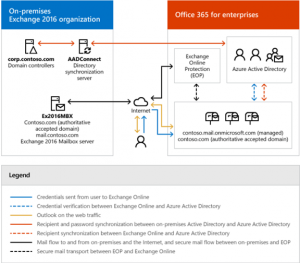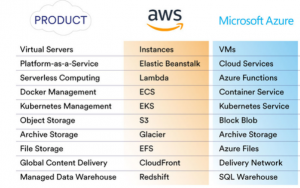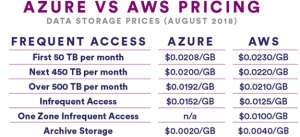Asada Harris – Cloud Engineer
Keywords – Azure, Microsoft, corporations, Cloud, AWS, Google, Skype, hybrid solutions, servers, functionality, infrastructure, Infrastructure as a service, Web application Firewall, suite of tools, platform
The dizzying array of cloud computing services that exist to support company functionality can be confusing. How does a company know if they need cloud services, and what is the best choice? Recognizing the functionality and adaptability of all the competing services offered is the best way in deciding whether using an application management resource is right for a company. Microsoft Azure allows corporations the ability to extend their technical capabilities to the cloud with flexibility with an eye on cost, technical restraints, and apprehension about cloud infrastructure.
What is Azure?
Azure is a cloud-based solution created by Microsoft that allows corporations the ability to extend their technical capabilities to the cloud. Historically, corporations have housed and managed datacenters on site. The cost to secure, cool, and license equipment in the past was astronomical. With that in mind, Microsoft created a solution (Azure) to rid the burden of managing and supporting physical equipment on premise by creating a landing pad, sort of speak, to address all architectural needs such as virtual machines and networking capabilities in the cloud.
Azure was introduced to the world back in 2008 and formally established in 2010. This gave Microsoft time to size up the competition after seeing AWS launch in 2006 and Google’s cloud offering soar in 2008. My technical introduction to Azure was in 2016. I consulted for a company that moved their email services to the cloud (to reduce cost associated with archived emails). The move also came with a few perks, being that Skype for business was on the cusp of retirement. This gave me the opportunity to research potential replacements. This is also when I discovered Teams and all its capabilities. Not to get to far in the weeds but I was able to successfully deploy Teams by promoting its ability to integrate with other cloud-based collaboration tools such as Planner as well as securing the transmitting of documents.
What Makes Azure Unique?
What makes Azure unique and a standout from the rest is its ability to offer users a hybrid solution for complex needs. For those that are unclear of what hybrid means, the approach gives engineers the ability to host servers on premises and manage user accounts and applications associated with them in the cloud. The greatest benefit and added value are not having to fully commit to all things cloud; the test drive method has made Azure a popular choice for corporations struggling with cost, technical restraints, and apprehension of moving their infrastructure to the cloud.
The image represents a hybrid deployment and extended capabilities into the cloud.

My experience with Azure has been joyful and a continuous learning cycle as products and services are introduced on a monthly basis. What convinced me that Azure was a reliable solution to more than just application functionality is when I was tasked to deploy replication services for backup and Name Servers in the cloud. Typically, when you deal with third party vendors that manage your DNS, replication can take anywhere from 8-24hrs to update records. Azure provided the capability to update those public facing records within an hour.
Services Offered
AWS and Azure have been leaders in the cloud space for over a decade. The image below is a representation of similar services offered amongst the two so in addition to hybrid capabilities Azure also meets the needs for infrastructure as a service.

Cost Factors
Although the image below is a rough estimate and may present some biases with regards to cost, Azure has managed to beat AWS by a few cents on average. AWS has proved to be more powerful and robust in compute capabilities and flexible options.

Benefits
Aside from cost factors Azures platform offers a robust suite of tools and services for every task. In my understanding, primarily AWS offers a single solution approach for simplicity and deployment of resources. Azure offers several “per service” resources, for example everyone is familiar with the traditional firewalls; however, Azure offers Web Application Firewalls and multiple secure routing services both policy-based and rule-based.
Final Words
In my opinion Azure can be very intimidating if your intent is to gain a thorough understanding of every tool and resource within the portal. My advice is to identify specific services that interest you like automation, DevOps, and networking and begin to explore additional resources within the console that are capable of making your solution scalable, resilient, and ultimately reliable.
***
Learn more about MBSE, Cybersecurity, and Cloud Engineering at G2-Ops.com.